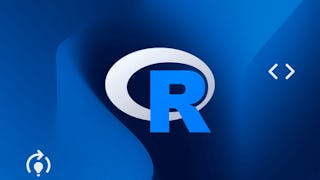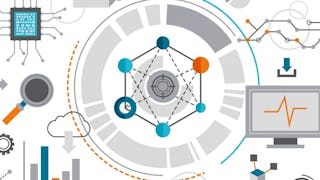Gain a foundational understanding of key terms and concepts in public administration and public policy while learning foundational programming techniques using the R programming language. You will learn how to execute functions to load, select, filter, mutate, and summarize data frames using the tidyverse libraries with an emphasis on the dplyr package. By the end of the course, you will create custom functions and apply them to population data which is commonly found in public sector analytics.

Enjoy unlimited growth with a year of Coursera Plus for $199 (regularly $399). Save now.

Fundamentals of Data Analytics in the Public Sector with R
This course is part of Data Analytics in the Public Sector with R Specialization


Instructors: Christopher Brooks
9,830 already enrolled
Included with
(52 reviews)
What you'll learn
Understand key terms and concepts in public administration, public policy
Learn foundational techniques using the R programming language
Create custom functions to analyze population data commonly found in public sector analytics
Skills you'll gain
Details to know

Add to your LinkedIn profile
12 assignments
See how employees at top companies are mastering in-demand skills

Build your subject-matter expertise
- Learn new concepts from industry experts
- Gain a foundational understanding of a subject or tool
- Develop job-relevant skills with hands-on projects
- Earn a shareable career certificate

There are 5 modules in this course
Welcome to the Data Analytics in the Public Sector with R and the First Course—Fundamentals of Public Sector Data Analysis with R. This week will be your orientation to the certificate and the first course. You will also get to learn several fundamental terms and their definitions that we will frequently use throughout the course and the certificate.
What's included
5 videos7 readings1 assignment1 discussion prompt1 ungraded lab
Welcome to Week 2! You will start this week learning about the core functions of public administration and the role of data analytics in these functions. You will also start developing your skills with RStudio.
What's included
13 videos3 readings2 assignments1 discussion prompt
Welcome to Week 3! You will learn this week several analysis skills for survey data—one of the most common types of data in the public sector. These skills will allow you to not only understand how survey data could be designed and collected, but also how to analyze such data in RStudio and how to interpret them.
What's included
14 videos2 readings4 assignments
Welcome to Week 4! You will learn this week several analysis skills for population data—one of the most common types of data in the public sector that allow answering basic population questions. These skills will allow you to not only understand the sources of population data, but also how to analyze such data in RStudio and how to interpret them.
What's included
7 videos2 readings4 assignments
Welcome to Week 5, the last week in this course! This week, you will get to hear stories from public sector data analysts, with the goal of recognizing the challenges associated with the profession of a data analyst.
What's included
4 videos1 reading1 assignment2 discussion prompts
Earn a career certificate
Add this credential to your LinkedIn profile, resume, or CV. Share it on social media and in your performance review.
Instructors


Offered by
Explore more from Data Analysis
 Status: Free Trial
Status: Free TrialUniversity of Michigan
 Status: Free Trial
Status: Free TrialUniversity of Michigan
 Status: Free Trial
Status: Free TrialUniversity of Michigan
 Status: Free Trial
Status: Free TrialUniversity of Michigan
Why people choose Coursera for their career




Learner reviews
52 reviews
- 5 stars
76.92%
- 4 stars
15.38%
- 3 stars
7.69%
- 2 stars
0%
- 1 star
0%
Showing 3 of 52
Reviewed on Mar 28, 2024
Great course that lays a solid foundation for the rest of the specialisation.
Reviewed on Jan 10, 2023
Instructors get 5 stars. Content gets 4.5. The 4 star rating due to some issues with the answer key/grading and some of the R assignments expected more knowledge than that presented.
Frequently asked questions
To access the course materials, assignments and to earn a Certificate, you will need to purchase the Certificate experience when you enroll in a course. You can try a Free Trial instead, or apply for Financial Aid. The course may offer 'Full Course, No Certificate' instead. This option lets you see all course materials, submit required assessments, and get a final grade. This also means that you will not be able to purchase a Certificate experience.
When you enroll in the course, you get access to all of the courses in the Specialization, and you earn a certificate when you complete the work. Your electronic Certificate will be added to your Accomplishments page - from there, you can print your Certificate or add it to your LinkedIn profile.
Yes. In select learning programs, you can apply for financial aid or a scholarship if you can’t afford the enrollment fee. If fin aid or scholarship is available for your learning program selection, you’ll find a link to apply on the description page.
More questions
Financial aid available,





